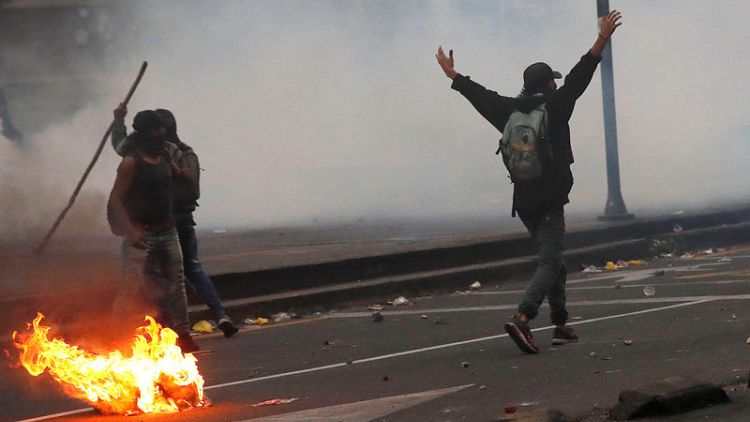By Alexandra Valencia and Mitra Taj
QUITO (Reuters) - Ecuadorean security forces cracked down on protesters in a massive national strike on Wednesday as President Lenin Moreno stuck by austerity measures that have triggered the worst unrest in a decade.
In Latin America's latest flare-up over unpopular structural economic reforms, protests cleared many streets of traffic, while schools closed and businesses shuttered from the highland capital Quito to coastal city Guayaquil.
The indigenous-led demonstrations were mostly peaceful, but clashes erupted in several parts of Quito and other cities, with masked youth throwing rocks and police firing tear gas.
Interior Minister Maria Paula Romo apologized to the country after police fired tear gas near two universities and a cultural center in Quito where safe areas for protesters had been set up.
"They were after a group of protesters but in no way is this admissible. I'm sorry," Romo said in a televised press conference after video of the incidents sparked criticism on social media. "This is not going to happen again."
The protests first erupted in the Andean nation of 17 million people a week ago when Moreno cut fuel subsidies https://www.reuters.com/article/us-ecuador-protests-idUSKBN1WI25Q as part of a package of measures in line with a $4.2 billion IMF loan.
"What the government has done is reward the big banks, the capitalists, and punish poor Ecuadoreans," said Mesias Tatamuez, head of the Workers' United Front umbrella union.
The main indigenous group CONAIE, which has mobilized several thousands members to Quito from outlying areas, demanded Romo step down and said the government was behaving like a "military dictatorship" by declaring a state of emergency and setting an overnight curfew.
Protesters barricaded roads in various parts of Ecuador from Wednesday morning with debris, while security forces blocked a major bridge in Guayaquil to thwart them.
Moreno, 66, who succeeded leftist leader Rafael Correa in 2017, has relocated his government base to Guayaquil where there has been less trouble than in Quito.
The demonstrators' main demand is the withdrawal of the fuel subsidy cut, which has sent transport and food prices soaring, though some were also urging Moreno to quit.
"I don't see why I should if I'm making the right decisions," Moreno said late on Tuesday, arguing Ecuador's large debt and fiscal deficit necessitated belt-tightening reforms.
For seven days, protesters have been marching and barricading roads with burning tires, while police in armored vehicles have responded with water cannon and gas.
"Moreno out!" and "Police murderers!", demonstrators shouted on Wednesday.
JAILBREAK
The unrest was the second major challenge to a South American leader this year over opposition to the IMF. Argentine President Mauricio Macri was trounced in an August primary vote amid stiff opposition to an IMF deal he signed last year.
Authorities in Ecuador have arrested more than 700 people in a week of unrest. Some 86 police and 360 civilians have been wounded in the unrest so far, Romo said.
One man died after he was hit by a car and an ambulance could not reach him amid the chaos, while another two people fell off a bridge during protests, with some unconfirmed reports that they died.
Amid the chaos, prisoners escaped from a jail in Manabi province, though officials said they were being rounded up.
Oil Minister Carlos Perez said the OPEC member nation had lost 232,000 barrels of production from the unrest, worth more than $12.5 million, after protesters entered some fields.
State firm Petroecuador, which normally transports 360,000 barrels per day to the Pacific Coast, halted its Trans-Ecuadorean Pipeline System (SOTE) and declared force majeure on international contracts.
Ecuador's debt sold off. The March 2022 bond was down nearly 6 cents to its lowest since February, its yield briefly topping 9% for the first time in eight months.
Moreno said he hoped dialogue could help end the dispute, promising measures to offset prices rises, including extra welfare benefits for the poor and credits for farmers.
The United Nations said it had held preliminary meetings with some social organizations at the request of the government, but stressed that they were not negotiations.
"If all actors are willing, the United Nations System is willing to collaborate as a facilitator," it said on Wednesday.
Some relief for Moreno's government came for the government in Guayaquil, where thousands dressed in white held a "peace march", outnumbering protesters scuffling with police and soldiers elsewhere.
Moreno has accused former friend, mentor and boss Correa of seeking a coup with the help of fellow socialist President Nicolas Maduro in Venezuela. But no evidence has been given.
Moreno had enthusiastically backed Correa during his decade-long rule, serving as his vice-president, but broke with him after winning election and moved economic policies to the right.
From Belgium where he lives, Correa has been applauding the demonstrators but scoffed at accusations of seeking a coup. Maduro, himself immersed in economic crisis in Venezuela, also denied involvement in Ecuador.
Moreno has support from the business elite and the military appears to remain loyal, but his popularity is less than half of what it was two years ago and he knows that indigenous protests helped topple three presidents before Correa.
"I don't want him to quit," said printer and father-of-eight Luis Calvopina, 53. "But I do want him to reverse this stupidity."
(Reporting by Alexandra Valencia, Mitra Taj, Carlos Garcia Rawlins and Jose Llangari in Quito, Yury Garcia in Guayaquil, Rodrigo Campos in New York; Writing by Andrew Cawthorne; Editing by Bernadette Baum, Tom Brown & Shri Navaratnam)
